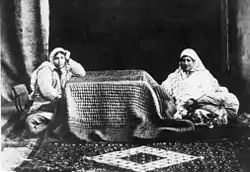

A korsi or korsí, or sandali (Persian: کرسی) is a type of low table found in Iran, Iraqi Kurdistan and Afghanistan, with a heater underneath it, and blankets thrown over it. It is a traditional item of furniture in Iranian culture. A family or other gathering sits on the floor around the korsi during the winter. A korsi used to be quite popular for entire families to gather together during yearly Yaldā celebrations.
Korsis are generally heated with electric elements or, traditionally, with a brazier containing hot coals that is placed under the table، some times coal brazier is placed in a hole digged previously before placing kursi ، this hole will be covered with wood timbers in warm seasons . The table is covered with a thick cloth called lahaf korsi (persian: لحاف کرسی) overhanging on all sides to keep its occupants warm. The occupants sit on large cushions around the korsi with the cloth over their laps.
A special woven rug called ru korsi (Persian: روکرسی), is usually placed over any blankets to protect them from food stains. Jajim textiles are sometimes used as the blankets for a korsi.[1]
See also
- Foot stove, a similar Dutch item
- Kotatsu, a similar Japanese item
References
- ↑ "Khalkhal nominated for national city of Jajim weaving". Tehran Times. 2022-04-12. Retrieved 2022-10-06.
- Arasteh, Reza & Josephine (1970). Man and society in Iran. Leiden: E. J. Brill. p. 138.
![]() Media related to Korsi at Wikimedia Commons
Media related to Korsi at Wikimedia Commons